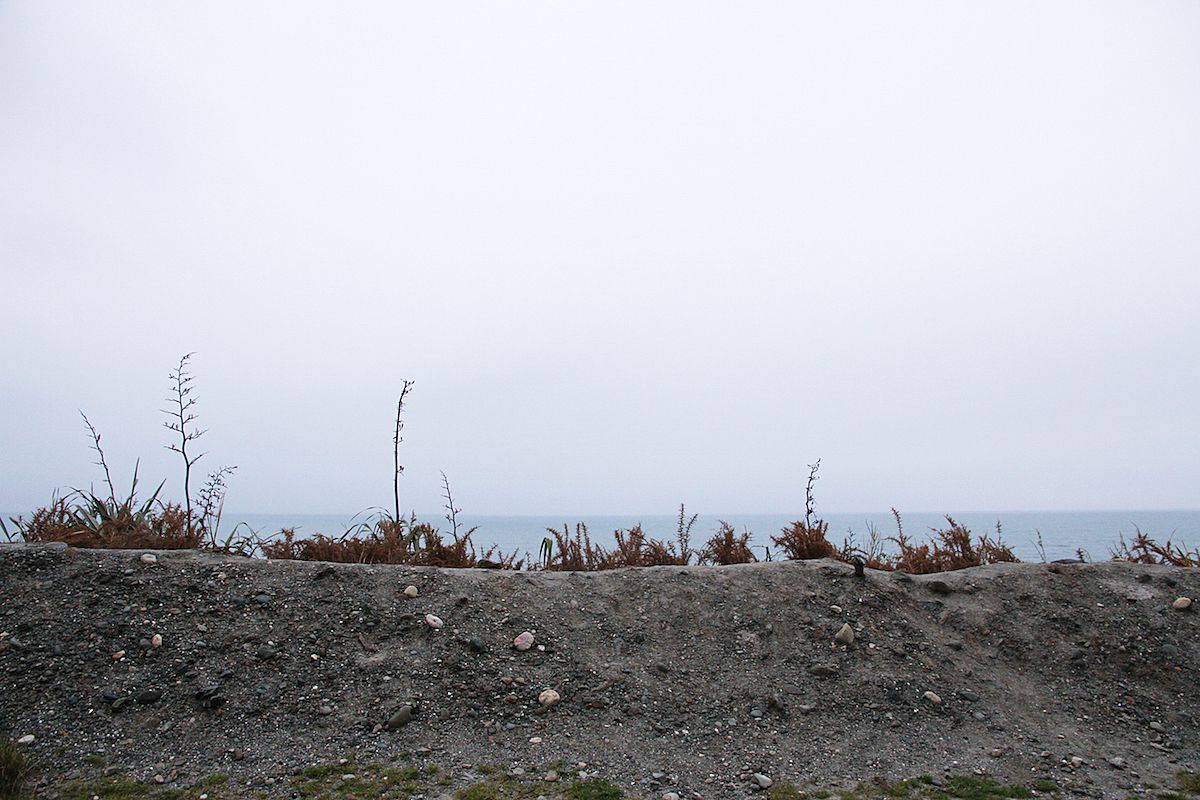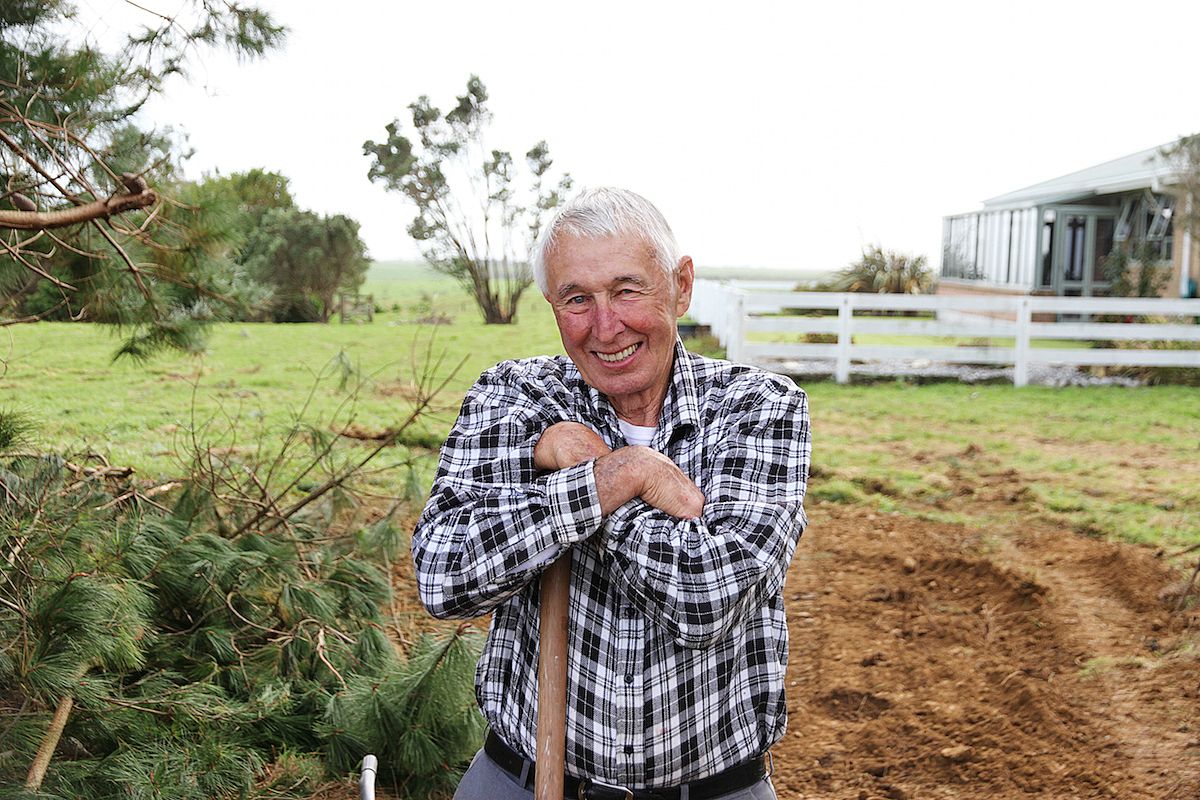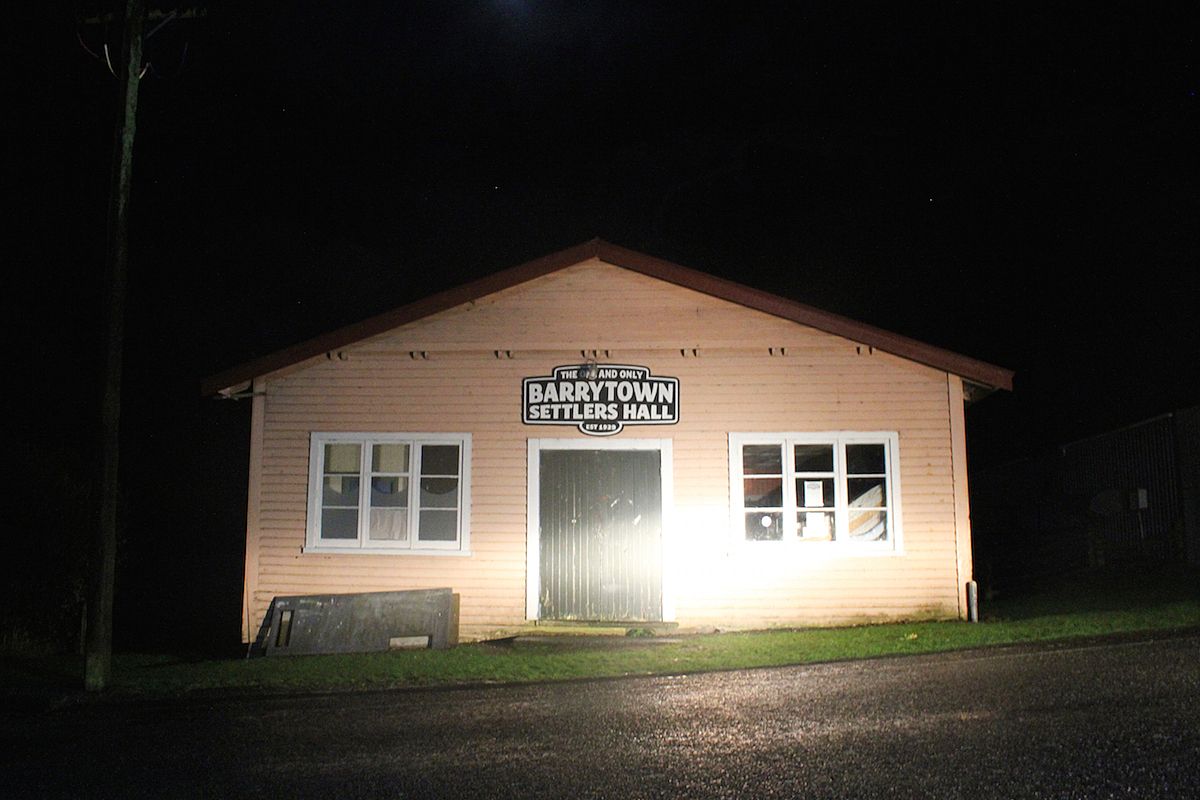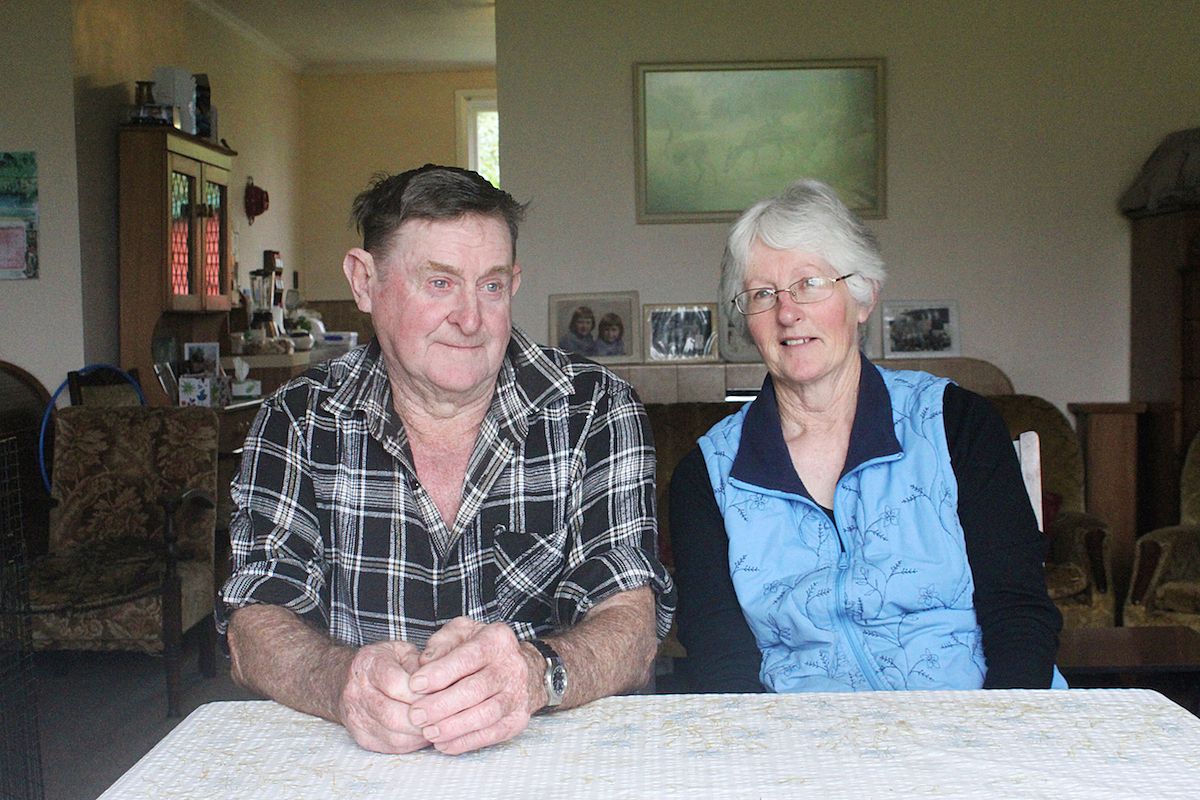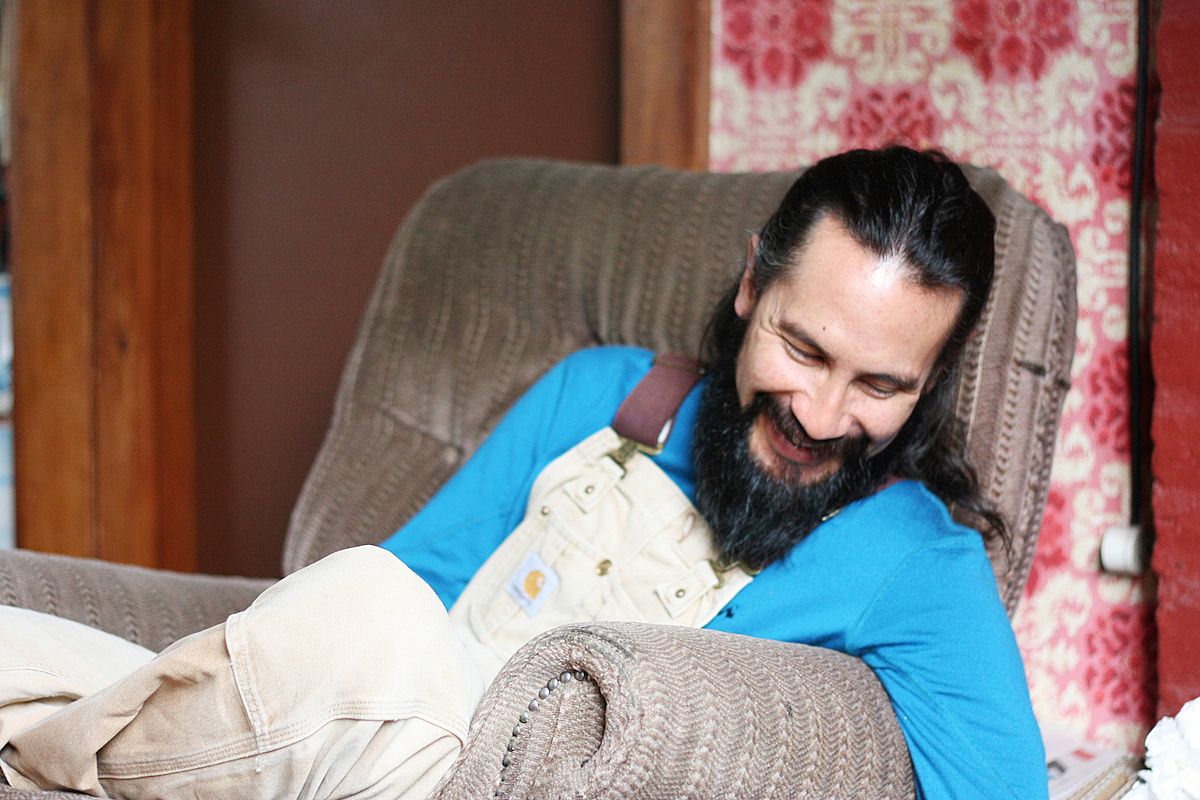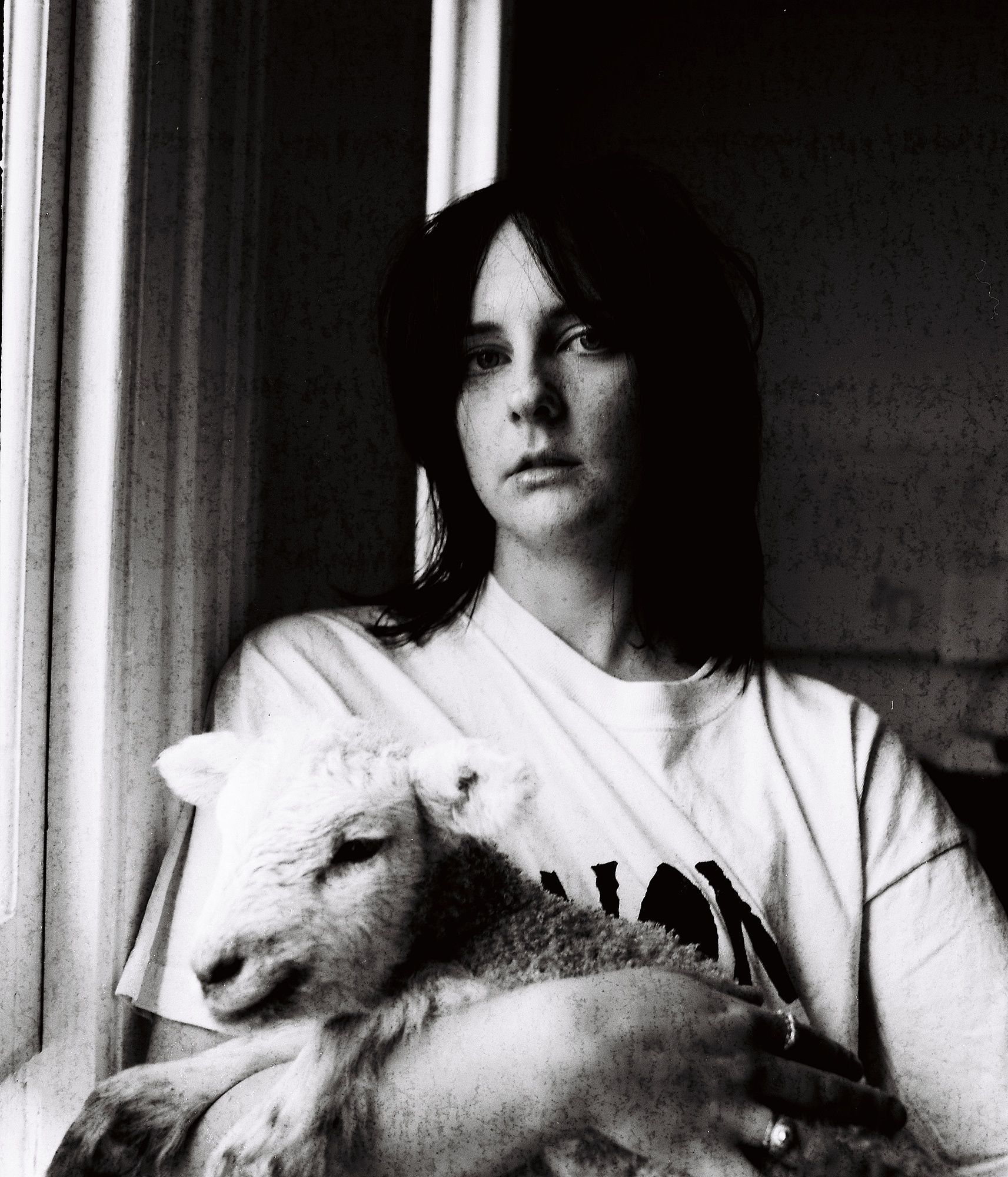Hanging on to the Edge of the World
Frances Libeau and Jenna Todd travel to Barrytown, a small settlement on the South Island's West Coast - famous for its eccentric locals and legendary Settlers Hall.
Only a few people have driven off the coast road, I’m told. Drunk. They got pulled out; no worries; soft limbs languid with alcohol across the seat of the wagon.
I’m poured another wine by Roger Ewer, chairman of the Barrytown Hall Committee. I raise my eyebrows and grimace in skepticism. He responds with a gesture of scorn. ‘Oh, there’s no police around these parts,’ he slurs while filling the glass. Wisps of unkempt grey hair halo a sun-spotted balding head, an unlikely angel in a blue linen shirt and zebra-striped trousers; Roger is drunk as Dionysus. It’s not the police I’m worried about.
Roger Ewer
Roger doesn’t wear jeans (‘as a rule’). He found the perfect pair of slacks at a second hand store; now when he needs a new pair he picks up fabric he likes and sends it off to a seamstress who makes them to the original cut of his perfect pair. I ask how much he pays for his new pants. Around $150, he says.
He loves linen. He loves the way it feels against his skin. Today he's wearing a turquoise linen shirt and zebra striped suit pants. No shoes. His toes are stubbed and worn. His toenails are cracked and half missing on one foot, dark blood crusted in their wake.
There was a funeral today, and the hall is decked out in ferns and flax. It looks beautiful. We’ve spent a week in Barrytown and no one seems to know who died. I ask Roger if he found out who it was. ‘Yeah,’ he chuckles. ‘He was actually a really good friend of mine.’--
The road winding up the coast from Greymouth towards Punakaiki weaves in and out from the waves. It curves inland, hugging the steep mountainside before scaling sharply down on sparse foliage, the only thing between four wheels and a grey frothing sea.
The West Coast is the stuff of legend; goldrush and mining wealth, hard labour with the promise of big cash; hard living and no bullshit. Hitting the coastline from inland is a point of departure. People turn left, south toward Hokitika, or North – towards Greymouth, Punakaiki, and further up the coast, Westport.
Barrytown, where we are headed, is literally a sign on the road. Blink and you'll miss it. There's one road in, and one road out. On the other side, the sea.
We’ve come to see a show: Tourettes, aka Dominic Hoey, a contemporary of ours from Auckland. I’m yet to meet Dominic, though I’ve recently learnt we were in a poetry paper together some years back. He’s never been to Barrytown. Neither have we, and after a week of being an unlikely tourist, of explaining my presence in an isolated part of the country to its locals, I’m looking forward to seeing someone from home, not having to justify myself.
Blink and you'll miss it. There's one road in, and one road out. On the other side, the sea.
We enter Barrytown off the main highway. This is Cargill Road, as straight and long as a runway heading out to sea. Imperceptibly, the road bends alongside the mountains, which lean over us forebodingly.
Barrytown proper is a small stretch of flat; wide and rounding back tight to the road, a pocket of coastline rolled flat as dough. There’s a smattering of houses. On our first pass-through, a young man sits on a verandah, flat-peaked cap on his head. A Subaru wagon is parked outside the house while a toddler wanders about. These are the youngest people we’ll see in Barrytown all week.
Out of the car, walking the stretch of road from the sea toward the hills, we see some significant damage to trees and fences from a recent storm. Acres of swampy grass provide a ripe turf for pukeko. The cemetery is wide, and full of unmarked graves, slumped hollows of unrecognised departure. Many headstones are barely legible, if at all.
By the graveyard we encounter an elderly man out in a plaid flannel shirt, slacks and gumboots, spade in hand, digging slowly – one scoop after the other. His name is Tom. Tom Dunn. He looks at us with a warm apprehension. He smiles. His white veneered teeth are either miraculously well-preserved or expensive.
We ask what he’s up to. He’s fixing his fence, he says. The tree blew over in the storm and fell on it. The tree, a huge pine, sure fell over. He’s old enough to struggle with the spade. Tom’s family go way back in the area; though the family were all born and buried in Greymouth, his Grandfather paid to have the Barrytown pub built. The recent owner charged ‘Queen Street’ prices. ‘He didn’t want the locals to be there.’
Tom Dunn
A little dog comes running over to us, followed by a woman. Tom’s wife, Pat. It’s a clear day. The weather’s been bad; Tom hasn’t been able to get out to this fence until now. I mention my surprise at how beautiful the weather is, how calm the water was despite the choppy conditions we saw on the drive. ‘That water can be as flat as this road,’ he says. ‘Sometimes it’s as rough as those bloody mountains too.’
----At the junction of Coast Road and Cargill, there's a large weatherboard pub building branded front, side and back with Monteiths – a West Coast brew if ever there was one. It’s closed now – the Aucklander Tom mentioned thought he’d capitalise on touring buses, but high prices and raucous nights drove the locals away and it went under some time ago.
Opposite stands the Barrytown Settlers' Hall, established 1910. From the outside it’s salmon pink and seemingly rundown, weatherboards surrounded by tussock grass. There is a heap of bending mattresses piled up in the window. This is the iconic 'Barrytown Hall'; a significant stopping point on many thirty-date rock tours for New Zealand bands since the 1970s, and a cult venue on the international music radar. The kind of groups that play here would fill most city pubs well beyond capacity: Shellac, Fugazi, UK Subs, Dead Moon. Even Townes van Zandt stopped in to play one evening in the 1980s. A small poster advertising the Tourettes show is stuck in the window of the hall, and we’re the only ones around to see it.
---
Later, at our hostel in Punakaiki (run by a German couple who sell dense German bread and cakes at reception) I pick up the phone and call George Langridge. He’s lived in Barrytown his whole life, some 75 years. He asks me if I’m related to his old mate Bill Duncan. I say no and explain that my family settled in the North. He proceeds to tell me about Bill anyway.
George Langridge has lived here his whole life, on and off, between working on roading up and down the coast. His grandfather, a carpenter, purchased the land he lives on with his wife Gladys, and built the house in 1952.
We drive eight miles south of Barrytown to see the Langridges. They live in a low, wide farmhouse, visible from the street by its large red shed and green doors. It’s raining in sheets. Ellen is on the TV. The sky grows darker overhead with raincloud. ‘The television will go off... it’ll go all funny in a minute’, Gladys warns, shadows and lines of static bolting over Ellen’s tanned face. I notice a hand-written sign warning visitors of native weka. They’re a bloody nuisance, George says. Gladys worries that if you fell over one might peck your eyes out.
The Langridges are an old family in the area. Why has he stayed? ‘The sheep are still here, so I may as well be.’ And the grandchildren, too - they live down the road, Gladys has just returned from putting them on the bus to Barrytown School. The roll sits somewhere between 19 and 23; one of the pupils recently appeared hula-hooping on New Zealand’s Got Talent. Everyone talked about it for weeks. Her name is Summer.
The sheep are still here, so I may as well be.
Jenna pulls out the camera and asks if they mind being filmed. Initially they shy away from us and are uncomfortable, but soon ease into it. When I ask them about their family history, they reach for framed photos perched on the sill behind the sofa, and delve into long-shut cupboards for their photo albums.
George can tell us about the Barrytown Hall, alright. His grandfather used to play music for the dances there, in the early days, the 1930s and 40s. The Fisher family at Punakaiki provided music later on, when George was a kid. ‘The old hall would be really rocking,’ he says... ‘bouncing up and down.’ The boys would tow each other around the hall on sacks, shining the floor up for dancing in a utilitarian game typical of wartime. They very rarely go to the hall these days, preferring to stay at home. Even so, they’re grateful that it’s still standing. ‘Roger’s been the backbone of keeping that hall going,’ George says.
With wide eyes, Gladys tells of the damage inflicted by the recent cyclone that blew through; the reason it’s looking a little worse for wear. The cowshed on their farm was flattened and the din gave them a hell of a fright. ‘We’ve never had anything like that, ever,’ she sighs. 'Our native bush has taken a pounding.’ Her eyes match the blue of her polar-fleece vest. ‘But you wouldn’t find a more beautiful place on a great day. The sea, the mountains... it’s fabulous.’
George asks about our families. Auckland is regarded with an air of quiet contempt, which makes sense given their recent experience - Aucklanders come down for sightseeing, fix up the pub for a quick buck, then run it into the ground. I’m embarrassed for my hometown and vaguely irritated by the blanket judgment, but more than anything, acutely aware that I wear the face and walk and clothes of a stranger. George hasn’t been to Auckland since before the harbour bridge was built. ‘I’m gonna have to go up there and check it out,’ he says, quite seriously, to Gladys. I offer to show him around.
Jenna sets up her camera. ‘You couldn’t have picked a worse day for taking photos,’ George says, before turning to his wife. ‘Have you got your best gear on, Gladys?’ Gladys blushes and ruffles her hair a little.
‘I think you look great,’ Jenna says to her.
‘I wish I could believe you, dear.’ She laughs.----We drive to Greymouth and pick up groceries. Tween schoolkids, awkward in their expanding skins, watch tanned young farmers in flannel plaid and gumboots; a goth kid with a pierced labret lurks alone. Ahead of me in the supermarket queue, the spotty ponytailed check-out girl pauses and asks her customer: ‘What do you do with your english muffins?'
----
Back up the coast, we call in to see Sophie Allan. She runs a horse and wagon business, touring the colonial route by beach in a simulation of when settlers first moved into the area. She and her partner David Morris built the wagon themselves locally, and spent two years finding the perfect horse, whose name is Murphy.
Sophie’s on the Hall Committee, and is in charge of booking bands. She’s not fussy. ‘It’s up to them if they want to come and play, so long as they’re not going to be raucous and disrespectful.’ That’s only happened once in her time, when the cheery member of an unnamed folk band had one too many and set off the fire extinguisher.
Up a long gravel drive, we pass a man pushing a mower around the yard. He waves. A dog barks. We knock at the sliding door of a dark wood house. Sophie is wiry and thin with pale skin. Dressed in jeans, a loose jersey and thick socks, I can’t place her age. She welcomes us in quietly. The exposed dark-wood panels of the sloping ceiling makes the house feel smaller than it is. There are books everywhere, an old desktop PC with a horizontal drive sitting on a table the wall.
The man mowing the lawn/gravel is David. He’s been here for 25 years; Sophie for 16 years. George had described them to me as the Barrytown ‘newbies’. David was caretaker at the school for several terms. He puts the jug on to boil and explains how he ended up in Barrytown.
Disillusioned with the developments of city life, he moved from Upper Hutt in the late 80s, having spent some time over this way sometime prior. ‘It fitted together without any conscious drive,’ he says. Heading up the coast, he passed the plot of land he lives on now, and knew it was where he wanted to be. He moved in months later; and when his landlord decided to sell the property, David received first option to purchase. ‘I don’t know if that’s serendipity or something a bit stranger than that, but yeah.’
If her partner’s arrival was serendipitous, Sophie’s was more the result of steely stamina; riding her horse over from Christchurch with her dog trotting alongside her. It took five days and a snowy cyclone hit on the way. It was the late 1990s.
‘I didn’t know where I was going to stop; hadn’t organised anything with anybody about staying anywhere. I just got up and did it... and then I got to the coast and it was pouring down. It rained for nine months once I got here. It was just miserable.’
‘The new born calves and animals hadn’t seen the sun,’ David pipes up. ‘The fur on their backs had started to rot.’
I ask why they’ve stayed as long as they have, perched on the edge of the world. ‘We’re stubborn. Or silly.’ Sophie smiles. ‘We’re hanging on.’
Everything rusts and rots
Life on the coast is not for the weak of spirit. The landscape is harsh and uncompromising, every moment lived in response to the elements. ‘Everything rusts and rots,’ Sophie tells me.
As the days progress, I’m increasingly overwhelmed by the landscape, bouncing back and forth between waves and grey-green mountains along the cold Coast road. I wake up in the middle of the night alongside a snoring German backpacker swarming with a sense of displacement.
It’s a perverse pleasure that’s both unfamiliar and achingly powerful. There’s a liberation in this oppressive landscape that quells my middle-class and city-bred anxieties around self and success. Here, just keeping the rain out is enough.
The big trees. The big sea. The big mountains. Everything is big.
I’m drawn back to something Roger said on the day we met and ate sandwiches outside his hand-built rammed-earth house nestled high up the hillside, the curved panelled ceiling absorbing the late afternoon sun. 'I like the power of the place,’ he orates between munches. ‘The big trees. The big sea. The big mountains. Everything is big.’
After making frequent trips to the coast from Christchurch in the 1960s to source clay for pottery, Roger made the move along with irregular drabs of other artists as the decade came to a close. He worked the mines; labouring – whatever he could lay his hand to to turn a dollar and support his creative life. A number of 'alternative lifestylers' (or as the local farming community would call them, hippies) settled for a while in the area to live out dreams of self-sufficiency and escape from impending apocalypse. The local population boomed, creating a demand at Barrytown School never seen again. ‘At the height of the hippie reproductive rate [the school] got up to 55 kids,’ Roger giggles.
But living on a thin line between land and ocean proved too much for many. 'A lot of people would leave because they felt oppressed by the trees and the atmosphere,’ he says. ‘Most people found that it wasn’t the ideal they’d come here to experience. That it was tougher, harder, wetter, muddier... getting through the winter with kids and stuff can be quite difficult.’----
As we pull up a gravel drive, a slight figure appears on the porch, wearing off-white work overalls on top of a blue merino, white gumboots up to his knees. Long, straight, black hair is swept up into a top knot. A pounamu hangs heavy on his chest. A huge Alsatian weaves around him, its ears pointing skywards in interest as we approach.
Leon Dalziel is something of an anomaly. Superficially, it’s because he’s not white. It’s an aspect of culture on the Coast I find unfamiliar: the absence of ethnicities here beyond NZ-European, the migrant Germans, and some Māori further south in Runanga and Greymouth. Leon is used to explaining it. His mother, a Thai science teacher, was on exchange in the region and fell for a local man who made his living sourcing jade stone in rivers along the coast.
The house is small and wooden, hut-like and cozy, with thick 70s upholstery and patterned wallpaper that’s faded to a uniform amber tone. Leon’s playing ambient electronic music on his stereo, curled up on an armchair.
He works from his childhood home as a web designer. He confesses that he’s probably the only one on the West Coast. His office features a 27-inch iMac and a gun rack stacked waist high with hunting rifles. ‘I’m pretty much living in the middle of nowhere but I’m still streaming music all day’, he grins.
Growing up in Barrytown with his brother, Leon attended school in the area until his parents shipped them off to boarding school aged 12. Following that, he ventured into advertising and lived in Sydney for a while, before settling in Nelson. This all ended with the death of his father four or so years ago, after a fatal slip during a walk up in the mountains. Leon came back to settle his affairs, and never left.
Having lived elsewhere before returning to his childhood home gives Leon fresh eyes for the place. ‘There’s still little things that excite me when I come across them’, he says endearingly. Amidst the books and land his family left behind, Leon is teaching himself to recognise a range of native flora, and he works closely with both the Blue Penguin Trust and the Paparoa Wildlife Trust; the latter of whom are dedicated to re-populating the region with kiwi. Despite the guns, he no longer hunts. His father also gave up when he stumbled across a stag and looked it in the eye.
I ask him how he feels about the weka, Gladys’ eye-pecking fears in my mind. He adores them. They kill rats. Rats kill birds.
When he’s not maintaining sites for conservation and tourism groups (along with the odd lawyer, accountant and online shop), Leon treks into the bush, clearing old paths around the mine shafts for historical preservation. He’s aware of his dichotomous lifestyle. The Jean Paul Gaultier cologne and grooming products I spy in the bathroom imply he hasn’t thrown the soap out with the bathwater. ‘I think everyone here has a different take on life’, he muses. ‘There’s a switch you can turn off. I’ll work the morning into the early afternoon and then I’ll walk away from all of that stuff. I can be in the middle of nowhere in my gumboots and just knocking around with the dog in the bush, completely separated from what I’ve been doing. It’s kind of extreme,’ he confesses. ‘But it feels normal and it feels good.’
He’s on the Hall Committee with Sophie and Roger, and a couple of years back convinced them to spend a bit of money on a small lighting rig, which has transformed the space as a live music venue. ‘Maybe we should get a smoke machine,’ he mouths cheekily. He works with Sophie to promote shows and events through the Hall’s Facebook page. Month to month, there’ll be a sell-out of 200 when bands like The Eastern come through town, a regional table-tennis championship; an annual mid-winter art auction.
We talk about the Tourettes show that is happening that evening, and the funeral taking place that same afternoon. Before we meet with Roger, no one knows who has passed on. ‘No one seems to know who it is... because it’s such a close-knit community, you’d normally know. So its a bit confusing. Everyone’s a bit curious,' Leon says. 'It will all become clear at some point. And then we’ll all forget about it.’
The phone rings. He leaves it. It rings again; it’s Dave Morris. Tourettes, having just played a show down the line in Wanaka, is stuck due to the closure of Haast Pass. Leon’s genuinely frustrated, seemingly more for our sake than for his. We’re flying out of Christchurch the following day. ‘It just makes it, seeing a band at the hall,’ he sighs. All I can think is how this might be the perfect end to a story about a place where people have no choice but to submit to their surroundings.----
We meet Roger for a drink at the hall anyway. It’s a routine with cancellations to hold it open for a tipple, in case any poor soul from down the line didn’t get the message and turns up. He pours the wine and changes into his ‘Hall’ outfit: the aforementioned zebra pants, shoes off.
Not a soul comes by, with the exception of Reda, who is also on the committee. She’s been down at Greymouth Hospital with her partner, who has sawn off his finger. She’s also missing a digit, as is the three-legged little terrier, Toru, limping around after her. Roger forces a wine into Reda's lap, gleeful for another storyteller to riff off.
Jenna lifts her camera and Reda hides her face inside her black fleece jacket. I’m not surprised – every one of our subjects, with the exception of Leon, has shied away from the camera. Roger won’t let us film the inside of his house (complete with a swing bed suspended on chains) for fear of sacrificing a hard-fought privacy.
This is a community that lives without the compulsion to document, a physical existence that functions so directly in response to the elements that it resists reflection.When people move to the coast, they are actively seeking isolation. There are hundreds of people along this stretch of coast that we haven't spoken to, and some of them speak with nobody at all. This is a community that lives without the compulsion to document, a physical existence that functions so directly in response to the elements that it resists reflection. But in its little hollow in the hills, Barrytown has a unique sense of togetherness fostered or forced through geographic constraints, played out often (though not exclusively) between the four salmon pink walls of the Barrytown Settler's Hall.
---
Tourettes plays the night following the scheduled show, to a score of people including those who Jenna and I have just left. We’re on a plane back to Auckland. During the flight I wonder where my home really is. A man in the seat behind me offers a ride to a young German traveller, and it crosses my mind that maybe Aucklanders aren’t so bad. The traveller politely declines, fear of the unacquainted apparent in her voice.
The week following our visit, Sophie, Dave, Roger, Leon and Reda get together with other committee members for a Hall working bee, repairing cyclone-inflicted damage. Tom Dunn fixes his fence. Old George Langridge jumps on his tractor and hauls out the broken posts that once saw his cowshed upstanding -- tearing up the earth in order to re-establish his roots, while Gladys shoos a weka from the garden.
Correction: A previous version incorrectly referred to David Morris as David Harris, the Langridges as the Langrages and Retta as Reda. This has been amended.
